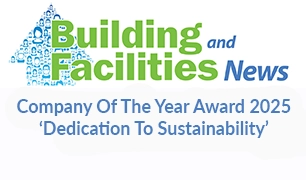The 2024 Budget, delivered by Chancellor Rachel Reeves, has been met with a generally positive response, given it was hoped to represent a significant step towards the country’s net-zero ambitions Adveco looks at what was announced and what it means for commercial decarbonisation of property. The budget outlines a range of measures aimed at decarbonising the economy, the most reported of which, once again impacts domestic homeowners. Most notably the Warm Homes Plan, with a £3.4 billion funding allocation over the next three years, the boiler upgrade scheme, and commitments to new home standards.
The funding is set to further drive home energy efficiency and low-carbon heating, especially in the form of heat pumps. Grants of up to £1 billion are to be issued in 2025 under the boiler upgrade scheme and are aimed to drive the uptake of air source heat pumps as well as growing the UK’s heat pump manufacturing supply chain. £1.8 billion has been specifically aimed at addressing fuel poverty and lowering household energy bills. With a commitment to building 1.5 million new homes which are to be future-proofed through standards to avoid the need for short to mid-term retrofit.
What are the 2024 Budget impacts on the commercial and public sector?
Labour campaigned before the election for an increase in renewable energy and has continued to show its support for offshore wind, solar power, and other renewable energy sources. The budget set out plans to fund further research and development, as well as support for the deployment of new technologies, with crucial investment in grid infrastructure to accommodate the increasing integration of renewable energy sources into the national grid.
The government’s aims for far-reaching future developments included particular emphasis on carbon capture, utilisation, and Storage (CCUS), allocating £3.9 billion to support the development of projects between 2025-2026. This funding will help decarbonise industries like steel and cement, capturing and storing CO2 emissions. A further £21.7 billion has been p[edged over the next 25 years to establish the UK’s first CCS projects, including the development of undersea carbon storage sites and pipelines.
Crucially, Reeves made commitments in the 2024 Budget to introduce significant investment in hydrogen infrastructure, from production and facilitation of storage and transport to utilisation technologies, including hydrogen fuel cells and hydrogen-powered vehicles.
The 2024 budget also includes a significant increase in public spending, with a focus on green initiatives aimed at accelerating the country’s transition to a low-carbon economy. This includes funding for the Department for Energy Security and Net Zero (DESNZ), which has seen a 22% increase in its budget to £14.1 billion in 2025-26. This funding will support initiatives such as the already outlined development of carbon capture and storage (CCS) and hydrogen technologies.
There was also a clear message of support for energy-efficient technologies in commercial buildings and industry, with a pledge to support insulation, efficient heating and cooling systems, and energy-efficient industrial processes. This is critical for net zero given the shear volume of existing commercial properties which require substantial retrofit to bring them in line with current building regulations and low-carbon operating requirements. Future commitments are expected to be announced via the DESNZ, its increased funding is expected to impact both the commercial and public sectors, with the latter expected to now receive £1 billion to fund local energy schemes to decarbonise the public estate. The public sector is expected to lead by example in its decarbonisation efforts, so funding for the electrification of public sector fleets, energy efficiency upgrades in public buildings, and the development of sustainable public procurement policies were all announced.
For the commercial sector, the budget provides a range of incentives to support the transition to a low-carbon economy. Tax breaks for investment
By investing in these areas, the UK aims to accelerate its transition to a low-carbon economy, create new jobs, and strengthen its position as a global leader in clean technologies. To help achieve this, incentives for businesses to invest private capital in low-carbon technologies and projects are to include tax breaks for green technologies, energy-efficient equipment and renewable energy sources. Additionally, support for green innovation will help businesses develop new products and services that can help reduce emissions. Reeves also announced the launch of the UK’s first national wealth fund to jumpstart this process. The fund is set to invest more than £70 billion into British clean energy and growth industries, including battery factories, ports, and green hydrogen production. Through greater investment, UK aims to create a more sustainable and resilient commercial landscape.
Overall, the 2024 Budget demonstrates a strong, and welcome commitment to decarbonisation and net zero. By providing financial support, creating favourable policies, and encouraging innovation, the government aims to position the UK as a global leader in the fight against climate change. However, the success of these measures will depend on various factors, including the effectiveness of implementation, the availability of a skilled workforce, and the global economic context. Challenges such as the high upfront costs of green technologies and the need for significant infrastructure and circular economy investments will still need to be addressed to ensure these processes continue no matter the party in government control between now and 2050.
















